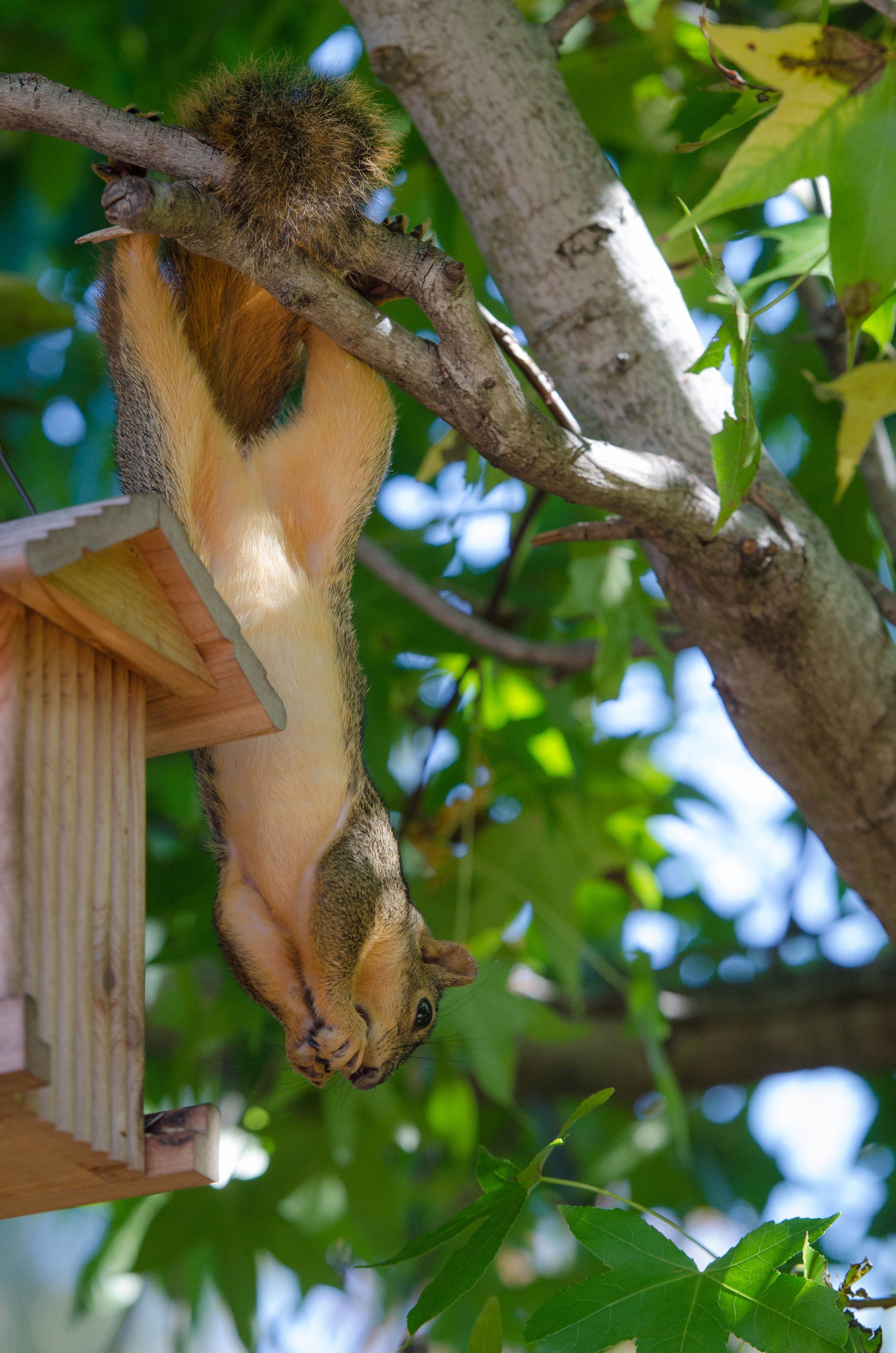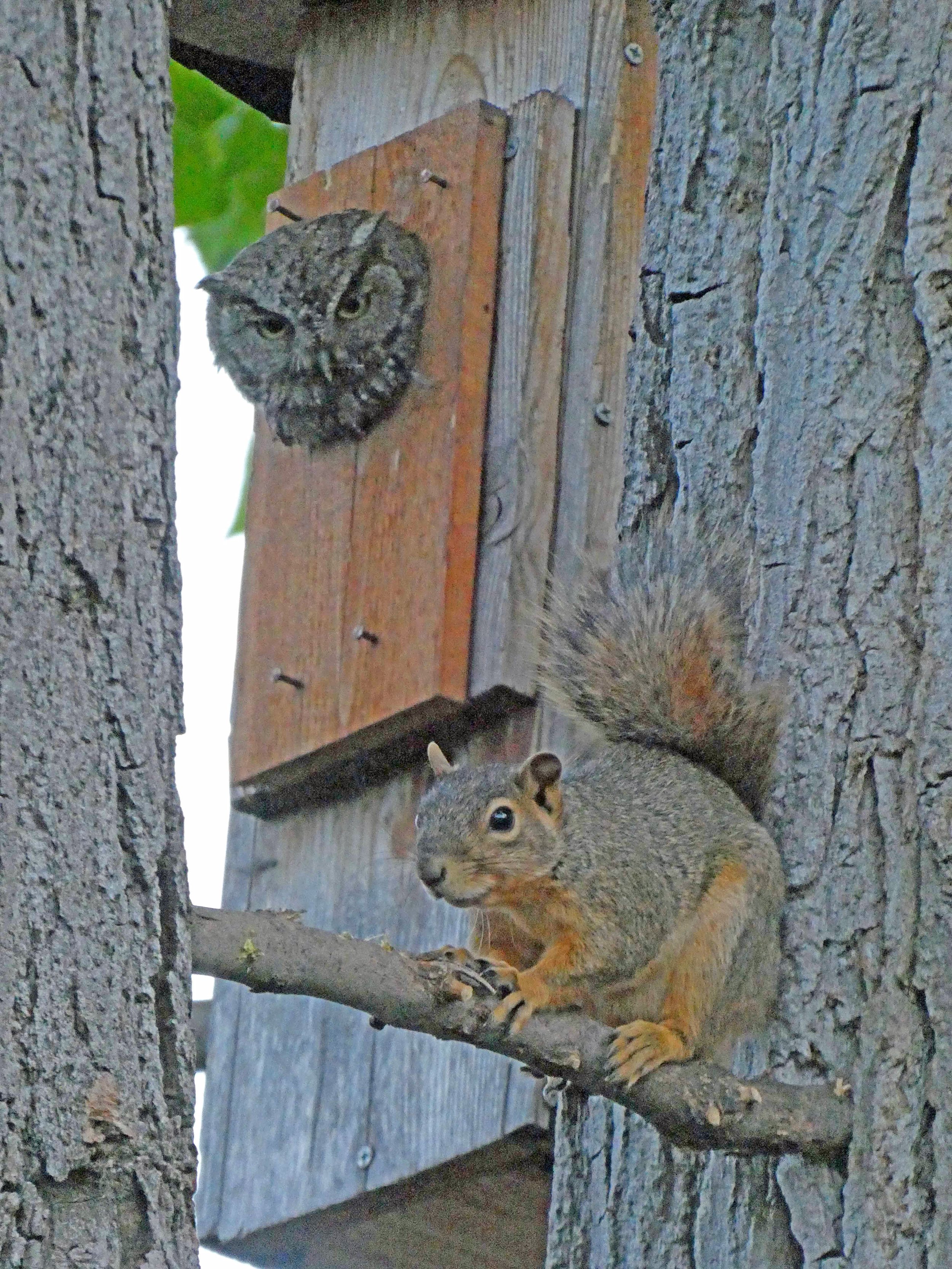Are Fox Squirrels Hurting our Bird Populations?
By Terry Rich, Golden Eagle Guest Blogger
I agree that fox squirrels are beautiful animals. But I wish we didn’t have any in our yard. I keep them off our bird feeders with baffles, which are 100% effective. But it’s a nearly full-time job to keep them out of our western screech-owl nest box before the owls arrive. Color me grumpy about squirrels.
I bring up squirrels because there is a notion that the fox squirrels in Boise are bird nest predators and therefore responsible for declines in some nesting bird species. Let’s take a closer look.
Idaho’s Squirrels
Unlike in the bird world, where we have well-established, scientifically based, classifications for our birds, mammologists seem to struggle a bit to put squirrels into categories. To avoid going too deep on this, let’s say that in most of North America we have fox squirrels, red squirrels, and gray squirrels. Once you get into the Southwest, it gets more complicated. So, let’s not go there.
As far as I can tell, the only native tree squirrel in Idaho is the American red squirrel. These are the little guys we encounter while camping in the mountains and who seem permanently peeved at our being there. Our dog, Sienna, spends a lot of time propped up on a conifer trunk, peering up into the needles wishing she could climb like a, well, squirrel.
Introduced tree squirrels in Idaho include the eastern gray squirrel. This is the species I grew up with in Wisconsin. They also occur in a rare, pure black form – we had a pair on our block – and felt our neighborhood was superior because of them.
Our other introduced species is the fox squirrel. According to Jack Connelly, long-time wildlife biologist at the Idaho Department of Fish and Game, the fox squirrel was introduced in the early part of the 20th century into many western cities. The main motivation for those introducing squirrels was likely aesthetic value – it is a lovely animal. Since then, it has expanded its range. But, in my experience, I still don’t see them outside of urban environments.
Are Squirrels Bad For Birds?
The question is, how bad are these squirrels for birds? We know all small mammals – shrews, mice, rats, ground squirrels, tree squirrels, and the rest – will eat bird eggs, young birds, and adult birds if they get the chance. But you can say the same for avian predators, such as jays, crows, ravens, hawks, and falcons. It’s tough out there, and it’s amazing to me that any bird makes it. Bird eggs and young birds provide calcium, protein, and many other vitamins and minerals squirrels can’t get from nuts and tree buds.
Fox squirrel Photo US Fish and Wildlife Service
So, what do we know about the fox squirrel’s impact on birds? I’ve already proposed that all small mammals eat birds and their eggs, given the chance. Fox squirrels are everywhere in Boise, so let’s assume they are impacting birds everywhere. One big problem is there are no multi-species, range-wide population monitoring programs for mammals as there are for birds. I routinely look at data from the Breeding Bird Survey, Christmas Bird Count, Project FeederWatch, and eBird for all sorts of questions about bird population trends and occurrence.
Serious Lack of Data
But mammologists have not established such programs for mammals. Yes, there are specialized programs to monitor things like winter deer and elk populations in particular parts of certain states. They also monitor rare species, like black-footed ferrets, wolves, and grizzly bears. But, as far as I know, there are zero general monitoring programs for mammals.
Thus, we have no idea what fox squirrel populations are doing. Or gray squirrel populations. Or raccoons, or anything else. Let’s give credit to scientific ornithology while we’re here. The Christmas Bird Count was launched in 1900 and the Breeding Bird Survey in 1966. And it’s not just the mammologists who have failed to start such monitoring programs. We also have no comparable information for reptiles, amphibians, or fish. I’ll hasten to say birds are much, much easier to monitor than these other classes of vertebrates. That’s one reason they are such good indicators of environmental conditions. They’re out during the day, reasonably conspicuous, and many tell us what species they are every time they call or sing.
So, the bottom line is we have no way to examine the relationship between fox squirrel populations and bird populations in Boise or Idaho. We just don’t have the squirrel data. A similar conclusion was recently reached in Great Britain on the question of the impact of gray squirrel populations on their birds. No squirrel data.
Do the Research, Then What?
We don’t have to just throw up our hands and walk away. This is a classic problem for research. I see two approaches. The easiest – and none of this is very easy – is to compare bird nest survival in areas with and without fox squirrels. Let’s just take American robins, for example. You find at least one place with robins with fox squirrels and one place with robins without fox squirrels. You find a bunch of nests and monitor them to see how they do in the two different situations.
But science is not happy with unreplicated samples. So, it would be much better to find three, four, or five such places to compare. You almost certainly need cameras on the nests because you have to eliminate nest losses due to American crows, raccoons, other predators, or weather events.
The other way is to do a similar comparison by removing squirrels from some areas and leaving them in others. The enormous problem with this approach is that removing squirrels is like trying to empty the Pacific Ocean with a cup. Every cup you remove is instantly replaced from the surrounding area. I know people who shoot squirrels and trap squirrels in their yards – hundreds of them. There is no end to it. They just keep coming back from the surrounding area.
And let’s say some brave grad student in biology does the research and finds fox squirrels are reducing the survival of all nesting birds in Boise by 70%. That’s scientifically interesting but so what? We already know removing squirrels from some local place seems to have no effect whatever on the population. Does anyone think we’ll remove fox squirrels from all of Boise? Never mind the biological obstacles, the politics (Save the Squirrels!!) would kill the program before Day 1. Not gonna happen.
Fox squirrel at feeder by Franco Folini Fox squirrel and Western Screech Owl by Terry Rich
Here To Stay
So, my sense is that fox squirrels are here to stay. They will do what they do. I’ll continue to protect our bird feeders and our screech-owl box as best I can.
On January 1st, I looked out on my deck to see a fox squirrel eating sunflower seeds on the deck railing where I spread a few for juncos and house finches. The squirrel’s fluffy tail was backlit by the rising sun, and mist was rising off the heated bird bath in front of it. I almost took a picture.
You can reach Terry at terryrichbrd@gmail.com.




